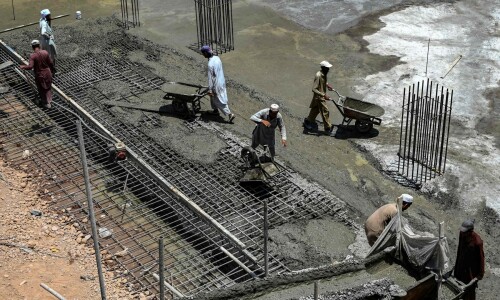ISLAMABAD: The government has decided to enhance the subsidies to merged districts of former Fata in Khyber Pakhtunkhwa, mainly in the power sector, while increasing the food subsidies to the Gilgit-Baltistan region.
The federal government has decided to grant Rs86 billion in power subsidy arrears for erstwhile Fata in the budget, and Rs65bn has been allocated in power subsidy for the upcoming federal budget 2024-25.
The power subsidy for former Fata in the outgoing fiscal year was Rs25bn, but the government paid Rs39bn under this heading.
The government has allocated Rs1.36 trillion in subsidies for the next fiscal year, compared to Rs1.07tr spent on this head in the outgoing fiscal year 2023-24. The bulk of subsides amounting to Rs1.19tr has been allocated for the power sector, mainly Water and Power Development Authority’s (Wapda), Pepco and K-Electric (KE) in contrast to Rs584bn spent on this head in 2023-24.
Wapda, KE, Pepco to get Rs1.19tr, up from Rs548bn in outgoing fiscal year
The budget document highlights that the power sector subsidies include Rs276bn for inter-disco tariff differentials, Rs108bn for tariff differentials to Azad Jammu Kashmir (AJK), Rs174bn for tariff differentials to KE, Rs48bn for Pepco and Rs500 million for an electricity subsidy for tube wells in Balochistan. It adds that the industrial support package for KE has expired.
Additionally, the power sector subsidy includes a lump sum provision of Rs509bn under various heads, such as government power projects, AJK’s electric revenue shortfall, KE’s transmission and distribution loss, former Fata subsidy arrears, and additional subsidies for the next fiscal year.
The government has also allocated Rs18.4bn as petroleum subsidies, which cover Pepco’s shortfall in guaranteed throughput, payments of shortfalls to Asia Petroleum, and subsidies to domestic consumers through Sui Northern Gas Pipelines Limited.
In the next budget, Rs12bn has been allocated for subsidies to Pakistan Agricultural Storage and Services Corporation to maintain wheat reserve stocks and cover the cost differential for wheat sales.
The subsidies for the production and supply of urea fertiliser have been reduced to Rs3bn from Rs25bn allocated in the last fiscal year, while the arrears and grants for the Ramzan package to the Utility Stores Corporation are Rs65bn.
Other subsidies amounting to Rs75bn include Rs15.87bn for wheat subsidy to Gilgit-Baltistan, Rs10bn for the import of urea, Rs1bn for the Naya Pakistan Housing Authority, Rs21bn for the Mera Pakistan MeraGhar Scheme (mark-up), Rs14bn for mark-up subsidies to support the phasing out of the State Bank of Pakistan’s refinancing facilities, Rs3bn for subsidies to Islamabad metro bus and Rs5bn for the mark-up subsidy of the Kissan package.
The federal government has allocated Rs66bn in grants to the KP government for the former Fata and Khasadars, while Rs47bn grant is for Sindh province to offset losses due to the abolition of the octroi and zila tax.
Other grants amounting to Rs1.66tr include Rs270bn in terms of contingent liabilities, Rs132bn in the head of miscellaneous grants, Rs64bn to railways and Rs13 billion in terms of relief.
Published in Dawn, June 13th, 2024

















































